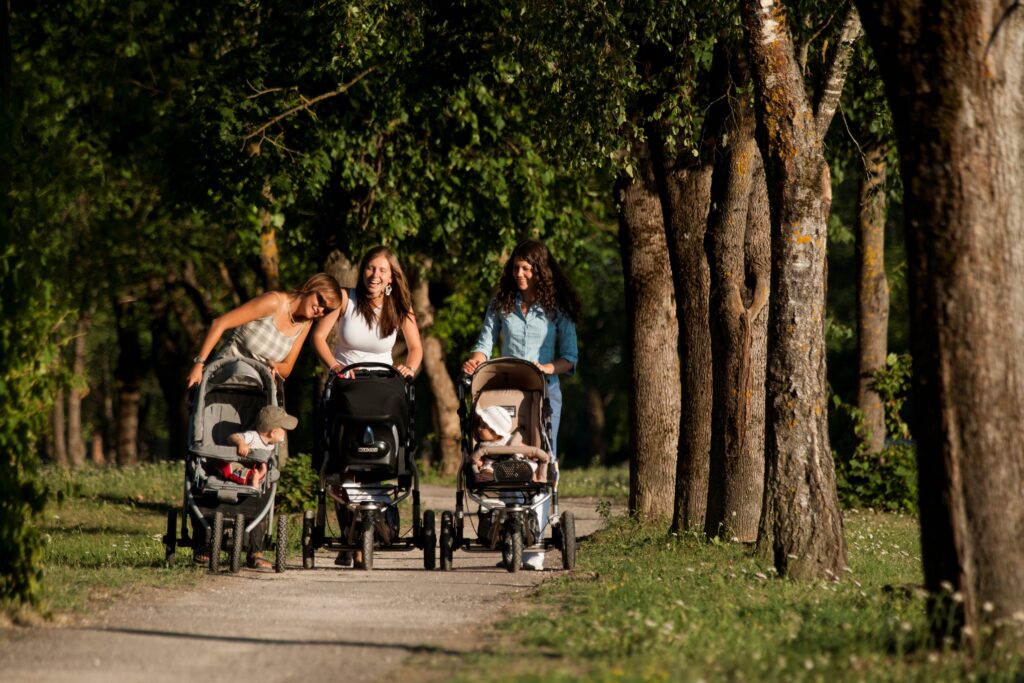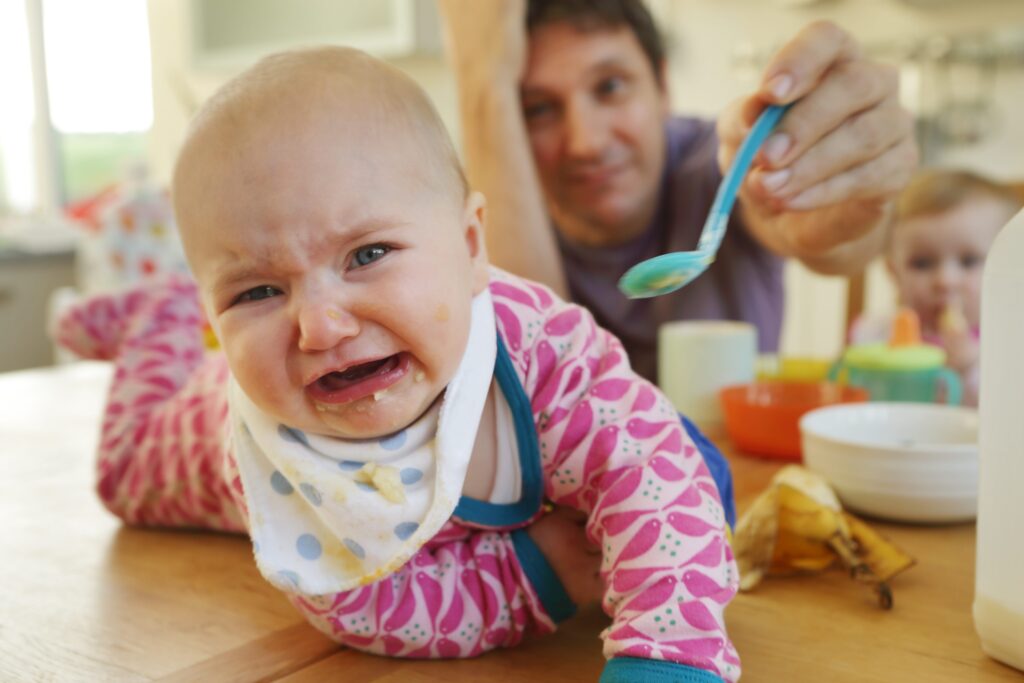- A recent story in The Cut stirred up a debate about whether friendships can survive kids.
- A lack of infrastructural support in the US and UK makes it especially hard.
- But social media and group chats can be a lifeline for parents struggling to stay in touch.
There are few shifts in life as momentous as having a baby, and it's no surprise that it can take a toll on our relationships.
A recent story in The Cut asked the question of whether friendships can survive between parents and non-parents, eliciting plenty of strong reactions on social media and in group chats. It's not a new question, but it feels particularly acute at a time when infrastructural support for parents is falling apart. Childcare costs are skyrocketing, a loneliness epidemic is brewing, and individual friendships are more precious than ever as community-oriented spaces disappear.
Insider gathered a group of editors — a mix of parents and non-parents — to talk about why the friendship transition to kids is so tough to deal with.
Below is a conversation with Zak Jason and Megan Willett-Wei, parents in New York City; Spriha Srivastava, a mom in London; Conz Preti, a mom in Maine; and Ariel Schwartz, a child-free woman in New York City. It's been edited for clarity and brevity.
Ariel Schwartz: Let's start with the assumption that friendships can survive children. So why is this such a hot-button topic?
Megan Willett-Wei: From my perspective, the topic of adult friendships has been one of the biggest zeitgeist discussions of my lifetime — friendship breakups is a great example of this — probably stemming from a fear surrounding tech and what social media is doing to us all. I'm probably more aware of the ebbs and flows of my different friendships than my parents were or cared to be at my age simply because we're talking about it more often. We're also told that friendships start to change in your 30s, the prime age when a lot of people either start having kids or are deep in the throes of parenthood, and I suspect it makes us self-conscious and sad to think about "losing" friendships, even if it's just the specter of change.
We've lost the community support 'village' that would make friendships easier
Zak Jason: I think friendships have become super essential to our lives. We've lost the "village," the close-knit multigenerational family and community of support, and friends have become more and more our chosen village. Like 150 years ago, the vast majority of people over 65 lived with their kids and grandkids. That number has been dropping and dropping since. So the stakes of losing time with friends when they have babies can feel incredibly high.
Schwartz: I've often thought about how the fact that we've lost that "village" you mention, Zak, makes things so tough. Community childcare support isn't a cultural norm in the US and it makes friendships in the parent/non-parent divide harder than they need to be. Lots of us non-parents want to babysit and generally help with childcare, and I wish that was more of an implicit assumption in our society. It's not, and it can require a lot of communication on both sides to make it happen. I wish it was easier.
Spriha Srivastava: Related to this, raising a child away from family takes its toll. There is a strong culture of community childcare back in India [where I'm from]. Friends like family step in to look after your child and help you. It wasn't the same here in the UK. We felt like we had to do it all. There is a lot of pressure and you have no brain space on weekends or at the end of the day to socialize, make new friends.
Childcare costs take a toll
Jason: In America, the more common expectation is that you basically buy the village, with daycare and babysitting etc. ... if you can afford it. This was the most sobering childcare stat I read this week: "A New York City family would have to make more than $300,000 a year to meet the federal standard for affordability — which recommends that child care take up no more than 7 percent of total household income — to pay for just one young child's care. In reality, a typical city family is spending over a quarter of their income to pay for that care, according to the U.S. Department of Labor."
Conz Preti: The main reason we left New York City when we found out we were going from one kid to three (yay twins!) was that we just couldn't afford it. Finding childcare in Maine was easier when we moved. We were able to send our son to a Montessori school 15 minutes away. Having our three kids in that school cost us less than what our friends were paying for one in New York City.
Srivastava: One thing I realized living outside of India and raising a child away from family — your ability to make friends when you have kids also depends on how much you are willing to spend on childcare. Childcare is expensive in the UK and staying away from family means we are always looking for our nanny or a babysitter to cover things like weekend dinner with friends or house parties or movies. There is a big cost to all that and it's even more relevant now that the UK is in the midst of a huge cost of living crisis.
Preti: I always joke that we have more childcare when we are in Argentina than in the US, because my parents, aunts, cousins, are all ready to jump in and take care of the kids. I am able to do so much more when I'm there, versus here where I'm racing against the clock.

The postpartum experience can have a big effect on friendships
Willett-Wei: The biggest omission with a lot of these conversations, in my opinion, is the postpartum experience. I have rarely heard an easy birth story. I personally had a C-section, leading my body to change in a way I hadn't anticipated when it came to my physicality. Add to that the complex dump of hormones and a lack of sleep and suddenly, you are quite literally in survival mode, if not dealing with very intense anxiety, depression, or forgetfulness. I felt like a completely different person. So with all of this in mind, no wonder friendships go on the backburner and sometimes parents are just unaware it's happening since there's so much else on our plates.
Schwartz: I knew nothing about the intensity of the postpartum experience until my parent friends started having kids. In fact, I don't think I fully understood until a lot of them were out of that period, because of all the factors you mentioned, Megan. I think if we talked about it more, it would really help with the hurt feelings in friendships that can come up during that time.
Jason: Does the postpartum experience feel hard to communicate or broach to friends without kids? Or do you feel pressure not to talk about it much, from the big societal pressure to remain efficient and productive and put together?
Willett-Wei: It definitely depends on the friendship! But I think you're getting at something big around the idea of perfectionism for parents, especially women and female-identifying people. I am very aware of my appearance and my home's appearance when I have friends over, or how well my kid is behaving, even if that friend professes not to care.
Infertility can make some friendships painful
Preti: Another thing that affected my friendships was infertility. I had a miscarriage between having my son and the twins and struggled to get pregnant for a bit. I look back now and noticed I stopped hanging out with my friends who were pregnant or had babies back then. It was a reminder of what I couldn't have. And I think so many people struggle with that in silence.
Srivastava: I relate to this. We took a while to conceive and it was a tough ride. It wasn't fun looking at negative pregnancy results every month. On the other hand, we were flooded with baby shower and first birthday party invites. Trying not to be selfish about this, we attended some of them but also struggled in silence through the process.
Having kids doesn't necessarily affect dads' friendships the same way
Willett-Wei: I think in heteronormative marriages and partnerships, the burden to "keep up appearances" usually falls on the woman. We're not often talking about "dads not being friends anymore with their single friends" as often as we do with moms. I'm fortunate enough to be in a marriage where my husband is carrying the mental toll with me and we encourage each other to take nights and weekends off with friends. Not everyone has that relationship or luxury — perhaps due to work schedules, priorities, or the way they were raised.
Jason: I just joined Insider a couple months ago, and my wife gave birth to our second kid seven weeks ago. I'm trying to get into a groove and establish myself here while also being an equally present, involved, loving parent to our two daughters (and occasionally see friends). But that I'm even able to try do all that right now is because there's an imbalance, especially physically. My body isn't the one feeding my infant every two to three hours all day every day. So that's part of it, I think, where I've become a parent but my body hasn't transformed. That might make the gap between dads with and without kids a little less severe.
For me, group chats have been a lifeline for maintaining adult friendships. I'm 34 and have a 2-and-a-half-year-old a 7-week-old. My friend group is a mix of people who've started to have kids in the past few years and people who don't yet have or don't want kids, and the group chat is beautiful chaos because of it. One dad will share an adorable quip his toddler just made, then another friend will go into graphic detail about a Hinge date gone horribly wrong, and we all live vicariously through it. But how does my friend who shares his Hinge dates really feel about all our dad chat? I don't know! Ashamed to say I haven't asked.
